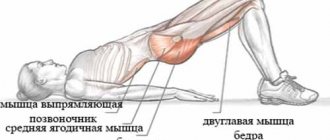How to combine strength training and running while cutting and gaining weight. Is it worth running every day? How to do it correctly. Despite the benefits of running, today it is increasingly difficult to find adherents of this sport. People stubbornly ignore the opportunity to “communicate” with nature and strengthen their body. But all that is necessary for this is to go out into the forest, park, lake (river) or stadium, devoting half an hour of your time for a run.
For many people, the question of the importance and benefits of running is far from clear. For example, few people know whether it is possible to run every day, what technique to follow, and what the benefits may be for the body. Athletes working to gain mass are also confused. They believe that running will only reduce the effectiveness of training. Let's look at the main nuances of daily running.
What effect can you expect?
Running invariably affects the functional state of our body - it compensates for the lack of energy (with regular exercise), normalizes the functioning of the central nervous system, strengthens the immune system, optimizes the functioning of the circulatory system, and so on.
Running is a reliable assistant in increasing endurance, an indispensable means for eliminating negative emotions, and a high-quality way to relax and relieve stress. As a result, regular exercise reduces the risk of heart attack. Against the background of strengthening the cardiovascular system, a double effect is obtained.
Proper running in combination with sports and swimming is the best way to combat insomnia, depression and information overload. Regular jogging is an opportunity to increase performance, improve well-being, and relieve nervous tension. In this regard, evening running is very useful. With its help, you can eliminate negative emotions and burn off excess “stressful” adrenaline.
During running, endorphins are released into the blood, the volume of which increases more than five times (when compared with the normal level). Endorphins improve mood, promote a feeling of general well-being, and suppress pain symptoms and hunger. That's why after a run your mood rises and a feeling of euphoria appears.
An important advantage for an athlete is strengthening the immune system. Several years ago, a large study was conducted in which more than two hundred people took part. The results showed that regular jogging increased the levels of lymphocytes, hemoglobin and red blood cells in the blood. As a result, the body’s protective qualities increase significantly. Subsequently, the antitumor benefits of running were discovered. That is, the earlier you start jogging, the lower the risk of getting cancer.
Is it possible to run every day?
You can run every day, except for a few cases:
- the girl is pregnant. In this case, there are restrictions on the training program that come into force from the first month of pregnancy;
- health condition does not allow constant physical activity. This may also be due to simple general malaise and chronic diseases, such as the heart or digestive system;
- with minimal physical fitness of a person. There are restrictions for a person who has never played sports, as well as for people who have not trained for various reasons over the past few years.
In all other cases, restrictions exist only on the intensity of the training program and the duration of the distance. Also, a restriction can be imposed on running with acceleration, since an untrained person’s muscles are not strong enough for such running exercises after the main load.
Why running in bodybuilding?
Running and active sports have a close relationship. Scientists have been able to prove that jogging is an excellent way to increase the body’s performance, improve the functionality of the heart, and increase physical performance. After just two months of training, the level of performance increases by a third, which invariably affects the overall effectiveness of training.
A big plus of running is the normalization of breathing and blood circulation, a positive effect on liver function and the volume of carbohydrates. In addition, the skeletal system is strengthened and the functioning of the main organs (primarily the liver) is improved.
Running is an opportunity to strengthen all elements of the musculoskeletal system, protect it from physical inactivity and improper changes. The result of regular jogging is improved nutrition of the intervertebral discs and cartilage in the joints.
The benefits of daily running

Let's start our conversation about the benefits and harms of daily running with the positive qualities of this sport.
Helps get rid of excess weight
Nowadays, more and more people start every day with a morning jog to get rid of fat deposits. The fact that we are starting to think about our health and beauty cannot but rejoice. Many people believe that running is the best way to lose weight. Actually, it’s hard to argue with this.
During training, a large number of muscles actively work, which leads to an increase in energy costs. If you don’t go into details, then no doubts arise. However, it should be remembered that in one jog lasting 60 minutes, the body will get rid of only 360 calories.
This suggests that jogging alone is clearly not enough to lose weight. To achieve your goal, you also need to do the following:
- maintain a proper diet;
- take into account your metabolic rate;
- conduct training regularly;
- give up unhealthy high-calorie foods.
If you decide to lose weight, then you should not consider jogging a panacea. You have to put in a lot of effort to achieve the task. The benefits of running in terms of fat burning are undeniable, but not unlimited.
Blood circulation is normalized
Most running fans believe that their workouts strengthen the circulatory system. Let's not argue, because this is a scientifically proven fact. Thanks to running, blood flow accelerates and the body is saturated with oxygen and various nutrients. Scientists have proven that with normal functioning of the hematopoietic system, people are less susceptible to the effects of all kinds of viruses and pathogens.
However, this issue also has its own nuances, primarily related to morning training. The fact is that immediately after waking up, the blood has a fairly thick consistency. It takes about 120 minutes for this indicator to normalize. If you do not wait, but immediately go for a run, then an unprepared person may experience blockage of blood vessels, fatigue of the heart, and cholesterol plaques may also break.
However, these risks will be minimized in the following situations:
- run not in the morning, but in the evening;
- Warm up well before each run;
- start moving at a slow pace and do not accelerate from the start;
- do not let things get to the point of overstraining your muscles;
- control your breathing and heart rate.
The condition of the whole body improves
Surely you know the saying - movement is life. It marked the beginning of the process of spreading awareness about the ability of running to improve the general condition of the body. Facts from the life of the ancient Greeks were cited as one of the evidence. It was among these people that the beauty of the body became a cult concept. According to sources discovered by archaeologists, in Ancient Greece the population had excellent health.
However, in our life, almost everything can not only be beneficial, but also turn out to be harmful. Each person can only withstand certain physical activities and running is no exception. Scientists say that:
- For an unprepared athlete, running can be extremely stressful.
- The cardiovascular system may be affected.
- With excessive load, the risk of microtrauma to internal organs increases.
- For some diseases, running is contraindicated, for example, epilepsy, diabetes, asthma, etc.
- You should not run after surgery until you have fully recovered.
- Injury to muscle tissue may occur.
- Prohibited for people with problems with the musculoskeletal system.
You have already realized that the healing effect of running is not always possible. You must remember this so as not to harm your body.
Increases endurance
While girls run mainly to combat fat accumulation, men note an increase in endurance among the benefits of this sport. That's right, if you exercise regularly, your muscles are in excellent tone and can tolerate higher loads well.
The benefits of this are quite obvious, but you need to adhere to the following rules:
- Train regularly according to your schedule.
- Each lesson must begin with a good warm-up.
- The time allotted for training should be used as rationally as possible and alternate the pace of movement to obtain maximum results.
- Control your breathing.
- Don't overexert your muscles.
- Only special running equipment should be used.
Increases the activity of hormonal and protective systems
You can often hear athletes say that the benefits of daily running are strengthening the hormonal and immune systems. It is useless to argue here, because numerous studies have confirmed this fact. However, not everything is as simple as it seems.
Scientists have discovered that a similar effect is achieved through the accelerated production of anabolic hormones. However, this is only possible under a certain psycho-emotional state. Jogging is clearly not suitable for achieving this. However, you can solve this problem by alternating the pace of movement. At the same time, this running method is not suitable for people who have problems with the joint-ligamentous system, the cardiovascular system and atherosclerosis.
Improves mood
Fans of a healthy lifestyle unanimously talk about running as an excellent remedy against depression. This is due to the increased synthesis of endorphins and is definitely a positive side of running. However, the question arises - for what reason do most novice athletes have to force themselves to go for a run?
Perhaps this is a matter of ordinary laziness or not? Scientists most often answer this question in the negative. Jogging at a monotonous pace does not in any way contribute to increased vigor. Agree, it’s quite boring to run leisurely even for half an hour. However, there are ways to eliminate this shortcoming:
- Combine jogging with other sports, such as swimming, football, etc.
- After training, it is necessary to provide the body with sufficient time to fully recover.
- Change your running style and training location often.
- Use moderate physical activity so as not to overload your body.
From all of the above, we can conclude about the benefits and harms of daily running. If you want to improve your health, then approach any sport with complete seriousness.
Should you run every day?
Many beginners, and even more experienced runners, are concerned about the question of whether it is possible to go for a run every day. Let's look at a few options here:
- If you are a professional athlete, then daily training is a necessity. Moreover, to improve results, you should run every 7-8 hours. On rest days, professionals also do not lie down on the sofas, but organize short runs.
- If you are an experienced athlete, that is, you have not been training professionally, but for a very long time, then going for a run every day is also required. There are people who run any time they get the chance. At the same time, the training itself does not cause problems - the body gets used to the loads and accepts them adequately. There is a belief among runners that without jogging and completing the weekly quota (90-120 km), real “withdrawal” can begin in the body.
- If you are a beginner, then you should not go out on the treadmill every day. Without proper experience, as well as without knowledge of running techniques and your own capabilities, you can only achieve negative phenomena - overwork and injuries. If you have no more than a few months of running experience, then don’t even think about running every day. The best option is 3-4 times a week for 25-30 minutes. After 3-4 months, you can increase the number of weekly workouts.

Again, consider the characteristics of each organism. Some people will be fine with running every day, but for others it's a big problem. If it is possible to increase the amount of training, then this is acceptable. The main thing is to correctly correlate your strengths with your capabilities.
Experienced runners claim that daily jogging is:
- reducing the risk of stroke or heart attack, normalizing blood pressure;
- cleaning the lungs and increasing their volume, which only improves the quality of life;
- ensuring a slim body by regularly burning calories;
- maintaining youth. Running has a beneficial effect on the body and prevents the aging process;
- improved mood (we already talked about this above);
- improving the functioning of the gastrointestinal tract, which allows the body to absorb nutrients 100%;
- healthy sleep. A short jog 60-80 minutes before bedtime helps you fall asleep faster;
- strong bones. As we mentioned, jogging is the best healer for bones and a reliable protection against osteoporosis or arthritis.
How to run correctly?

In order not to harm the body, your training must be carried out in accordance with certain rules. Only with a well-constructed training plan will you receive benefits and not harm from daily running. Let's look at this issue in more detail.
- Fresh air.
This is a fundamental condition for obtaining the positive effects of running. Choose a place for training so that there are no industrial enterprises or highways nearby. A park can be a great place for a jog. - Running shoes and comfortable clothing.
We have already said that during running, all elements of the joints are subject to shock loads. This is the main negative aspect of this sport. To minimize the risk of injury, you should only use specific running shoes. Now there are a large number of such products on the market from the world's leading brands. You should not save on your health by purchasing cheap fakes. Don’t forget that clothes should be as comfortable as possible. If you run during the cold season, dress appropriately for the weather. - Time of the training.
We have already briefly touched on this issue when talking about the positive effects of running on the circulatory system. Only you should choose the time for classes in accordance with your plans for the day. However, if you want to run in the morning, then wait at least an hour from the moment you wake up. - Physical exercise.
It is extremely important to select the optimal loads. If you are just starting to run, use a slow pace for a minimum distance. According to the results of studies, men are not recommended to run more than two dozen kilometers a day. For women, this figure ranges from ten to fifteen.
To learn how to start running every day, watch the video below:
[media=
https://youtu.be/3i8pfHPU39U
]
Combining training and running: where is the “golden” mean?
Running is really effective and has a positive effect on the body. The only question is whether it can be combined with training in the gym. For example, is it allowed to do several bodybuilding classes a week and do cross-country runs? Many people believe that in this way they can “kill” several “birds with one stone” at once - build muscle, become stronger, increase speed and endurance.
Practice has shown that when doing fitness, running is not only possible, but should be included in the training program. The only thing is that its intensity and frequency must be different. If the goal is to lose weight, then jogging can be done at least every day. When gaining weight, it is better to reduce physical activity and forget about cross-country after classes, as well as directly between workouts. Jogging for short distances is acceptable, but nothing more.

Let's take a closer look at each option:
- Increased strength and mass. If your goal is to build muscle and achieve results in strength exercises, then it is better to limit running. It is important to understand that after exercise the body needs recovery, which will require carbohydrates, proteins, enzymes, hormones and, most importantly, time. It is important to consider that our body's resources are not limitless. If you take away nutrients for running, then there will be nothing left for muscle growth. Active running can slow down or completely stop muscle growth. In addition, jogging is not advisable even on rest days. All that the body needs during this period is complete rest and preparation for future training. The maximum you can afford is a recovery run every 6-7 days.
- Running for drying. If the goal is to burn excess fat, increase performance and become more resilient, then jogging is simply necessary. In addition, running can be combined with other aerobic exercises, such as an exercise bike, rowing, and so on.
Jogging should be easy
Maxim Denisov, founder and head coach of the Gepard school:
– First of all, answer yourself the question: “Why am I running?” If it's just jogging, light jogging, then why not? The load when running this way is not much greater than when walking. You're not asking if you can go every day? And if your runs have ceased to be just jogging walks and have grown into training, then in this case a rest day is simply necessary.
In general, the most important thing in training is meaningful load. Each type of training has its own clear goal. It is important to perform workouts in a certain sequence, because you don’t just need to give the body a load, the main thing is that the body can digest it and then reach a new level. At Cheetah, we usually take a rest day at the beginning of the training week, after a long cross-country weekend.
How to give aerobic exercise so as not to stop weight gain?
If running is necessary for the body, but at the same time you want to gain total weight, then follow the rules below:
- use this exercise to warm up. In this case, the distance should not exceed one kilometer. At a leisurely pace, warming up will take no more than 7-8 minutes. If the body is prone to obesity, then the total jogging time can be increased to ten minutes;
- once every 6-7 days, set aside time for a full cross-country race. In this case, the total distance should not be more than three kilometers with a total running duration of up to 20 minutes. Thanks to such a jog, you can improve metabolic processes, relieve general tension, recover from strength training, and so on. The main thing is not to overload the body and follow the recommendations.

If the body has a hard time gaining weight even with good nutrition, then it is better to stop running. It will be more useful if the remaining resources are spent on muscle restoration and exercise in the gym.
It is important that training is systematic
Denis Vasiliev, coach of the running club Runlab Running Laboratory, St. Petersburg:
– Yes, of course, you can run every day. If you are an experienced runner and your level of training allows you to do this. And also if you have enough time to recover after exercise. When training becomes daily, it is important to systematize the process: after a hard training day there should be a light recovery day, and so on.
Follow this principle, monitor your physical and psychological recovery, and then even daily running will not burden you, but will bring you joy and pleasure.
Is it possible to do frequent sprint runs?
Despite its nature, speed running is work that allows you to become stronger, increase overall muscle mass, and make movements sharper. Practice shows that in strength sports (bodybuilding, powerlifting and others), the inclusion of short distance runs is mandatory. In this case, the distance should be up to 100 meters, no more. In this case, the “explosive” strength of the reed muscles increases, which is so necessary when working with a barbell.
In addition to high-speed jogging, high and long jumps, as well as regular squats, will be useful.
When is it prohibited to run every day?
Daily jogging is prohibited in a number of cases, which mainly relate to the health of the runner. Many people have significant restrictions on physical activity, as a result of which the training system is compiled individually. However, daily running or increased intensity is strictly prohibited.
Bad feeling
The first limitation for daily running is poor health, which is divided into two categories:
- general malaise, for example, poisoning. If you have any general malaise or feel unwell, running is not recommended, as this can lead to negative consequences;
- chronic diseases. If you have a disease, in particular a chronic one, there are significant restrictions on physical activity. Most often, a ban on daily jogging is imposed for various diseases of the heart and digestive system, including the stomach.
If you feel unwell due to the category of malaise, an individual jogging plan is carried out, which must be drawn up together with a specialist.
Pregnancy
During pregnancy, there are a number of factors that limit daily jogging:
- an almost complete ban on intense running training is imposed if there is a possibility of miscarriage;
- daily training can be carried out only during the first two to three weeks of pregnancy; in the future, the intensity and duration of training will depend on the condition of the fetus.;
- It is strictly forbidden to train daily during the period from the second to the fourth month and from the eighth to the ninth, since this time frame includes the most dangerous period for miscarriages.
Training after a long break
Restrictions on running after a long break are divided into two groups:
- past long-term illnesses. Indeed, in this case, the restoration of the body will take quite a long time. At the same time, at the initial stage, daily running training is prohibited for two to three months, since the body may not have time to recover;
- a typical long break from running. When regaining lost form, initial exercises lasting up to a month will be limited in daily performance. This is required for the muscles to return to their previous tone and gain endurance and elasticity.
Daily running is the best way to normalize the functioning of the body and bring it into constant tone. At the same time, we should not forget that each person has his own limitations on a number of principles, so when running you should follow all the rules.
You should also not run through pain, as this can lead to deterioration of your health. Running training programs are created specifically so that a person can avoid various injuries and damages.
Level of training and sports experience
If you are just thinking that the time has come to start running every day in the morning, and before that the last time you ran was at school or university, it may make sense to consider a rational and correct entry into your running path:
- for the first two months, start your day with race walking, gradually increasing its pace and duration, so your heart and lungs will be more or less prepared to start slow jogging;
- Conduct your first running workouts as calmly as possible, listen to the sensations of your body, and evaluate your heart rate. Choose the optimal rhythm for yourself - one in which you will not be out of breath. In the first days of your training, you will feel severe fatigue and muscle pain, so for beginners it is best to run every other day, spending no more than 30 - 40 minutes on a run;
- When you feel that your body is ready for daily jogging, you can start jogging, but do not forget that overtraining only brings harm, so periodically arrange a rest day for yourself.

If you rate your athletic level as advanced and have a history of regular running training, daily running will benefit you in the following cases:
- you want to lose a small amount of extra pounds. In this case, a combination of a properly selected diet, which implies a slight daily calorie deficit, and daily morning jogging on an empty stomach lasting 30-35 minutes will help you lose the hated fat. Running every day in the evening will take you longer: for direct fat burning, you will need to run at least 60 minutes in order to deplete the glycogen stores accumulated during the day and begin to use your own fat reserves.
- you are preparing for a competition . The preparatory period for daily jogging takes about 30 days, but it is extremely important not to overtrain during these days, so you need to rationally alternate the load. For example, on day 1 you do a high-intensity running workout for 30 minutes, on day 2 you do specific strengthening exercises combined with 40 minutes of light jogging, on day 3 you run a speed cross-country, and so on. .
It is important
Monitor your well-being, the condition of your joints and knees. Excessively intense preparation for competition can cause injury or overtraining.

Daily jogging can harm experienced athletes in the following cases:
- you are at the recovery stage : after difficult and serious competitions, after suffering an injury or illness. In this case, you need to take a short break (up to two weeks - according to the recommendations of your trainer and supervising physician); during the recovery period, you can combine a light 40-minute health jogging three times a week with yoga, swimming pool classes, Pilates, and a course of therapeutic restorative massage .
Make running a habit
Most people can form a habit in 10 weeks. Imagine the power of habit spanning years! Stories of runners maintaining their running habit through wedding days and through tragedy are inspiring, but the secret is simple; habit formation.
Our brains love to be efficient. That's why when we get into a car, we automatically put on a seat belt. We save effort. Over time, the decision to work every day can also become automatic and require very little effort.











